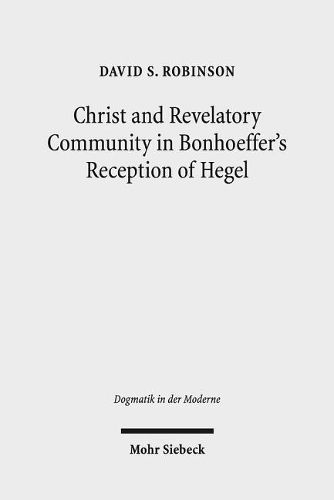Readings Newsletter
Become a Readings Member to make your shopping experience even easier.
Sign in or sign up for free!
You’re not far away from qualifying for FREE standard shipping within Australia
You’ve qualified for FREE standard shipping within Australia
The cart is loading…






How is God revealed through the life of a human community? Dietrich Bonhoeffer’s theological ethics begins from the claim to ‘Christ existing as community’, one of several variations on G.W.F. Hegel’s philosophy of religion. David Robinson argues that Bonhoeffer’s eclectic use of Hegel’s thought, from the socialising notion of ‘objective Geist’ to a trenchant depiction of the ‘cleaving’ mind, should not be obscured by his polemic against Idealism. He also offers close readings of Hegel’s texts in order to appraise Bonhoeffer’s criticism, particularly the charge of a ‘docetic’ distinction between idea and appearance in Christology. Meanwhile, historical context is provided for Hegel’s ‘deconfessionalisation’ of the church vis-a-vis the state and Bonhoeffer’s recovery of the ecclesio-political mark of suffering as non-recognition. The author provides a vital enquiry into the social compositions of faith and reason.
$9.00 standard shipping within Australia
FREE standard shipping within Australia for orders over $100.00
Express & International shipping calculated at checkout
How is God revealed through the life of a human community? Dietrich Bonhoeffer’s theological ethics begins from the claim to ‘Christ existing as community’, one of several variations on G.W.F. Hegel’s philosophy of religion. David Robinson argues that Bonhoeffer’s eclectic use of Hegel’s thought, from the socialising notion of ‘objective Geist’ to a trenchant depiction of the ‘cleaving’ mind, should not be obscured by his polemic against Idealism. He also offers close readings of Hegel’s texts in order to appraise Bonhoeffer’s criticism, particularly the charge of a ‘docetic’ distinction between idea and appearance in Christology. Meanwhile, historical context is provided for Hegel’s ‘deconfessionalisation’ of the church vis-a-vis the state and Bonhoeffer’s recovery of the ecclesio-political mark of suffering as non-recognition. The author provides a vital enquiry into the social compositions of faith and reason.